Justice and Change in the Global World: Examining Societal Issues
VerifiedAdded on 2020/05/08
|6
|1452
|161
Essay
AI Summary
This essay delves into the multifaceted issues of justice and change within the global landscape, examining how global challenges impact individuals and societies. It explores the importance of common good, human dignity, and the role of advocacy in addressing global problems. The essay analyzes various networks, including policy, knowledge, governance, and watchdog networks, that strive to resolve global issues. It highlights healthcare inequalities, particularly within the Australian context, emphasizing the need for equal access to healthcare services and the impact of demographic factors. The essay also discusses the principles of Catholic Social Teaching, such as human dignity, common good, subsidiarity, solidarity, preferential options for the poor, economic justice, stewardship of creation, and promotion of peace, and their relevance to global challenges. The author references various academic sources to support the arguments presented, providing a comprehensive overview of the complexities of justice and change in the modern world.
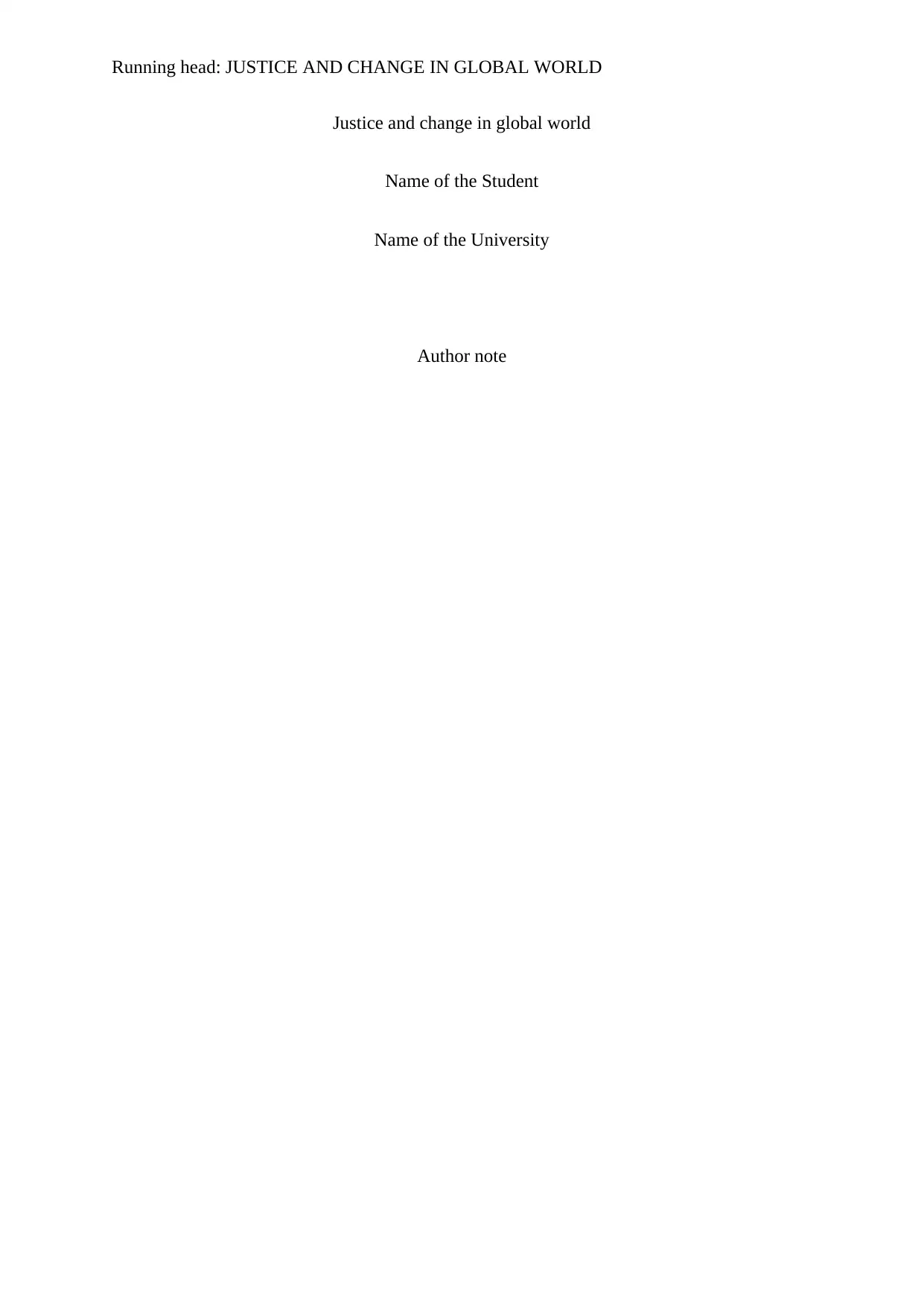
Running head: JUSTICE AND CHANGE IN GLOBAL WORLD
Justice and change in global world
Name of the Student
Name of the University
Author note
Justice and change in global world
Name of the Student
Name of the University
Author note
Paraphrase This Document
Need a fresh take? Get an instant paraphrase of this document with our AI Paraphraser
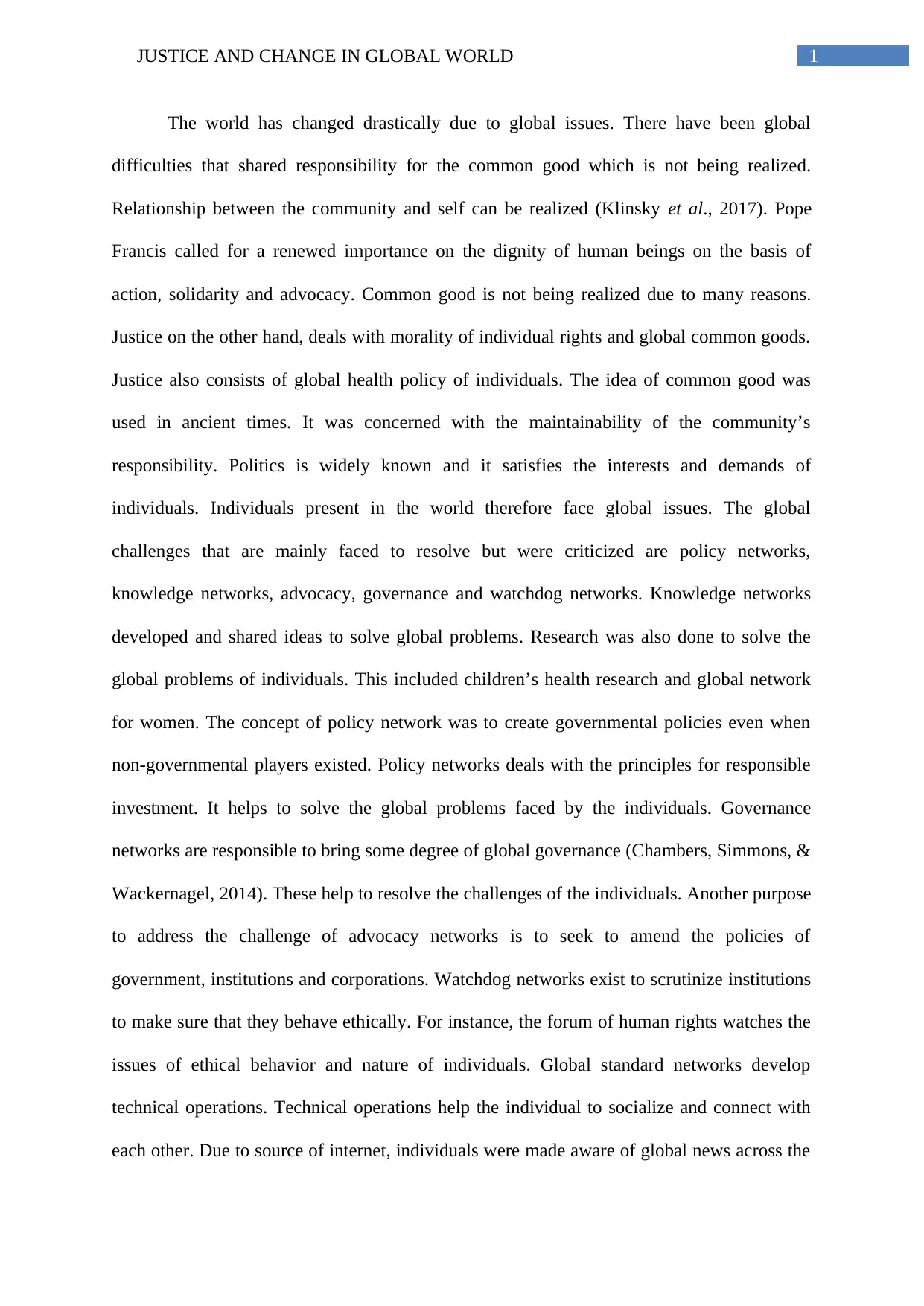
1JUSTICE AND CHANGE IN GLOBAL WORLD
The world has changed drastically due to global issues. There have been global
difficulties that shared responsibility for the common good which is not being realized.
Relationship between the community and self can be realized (Klinsky et al., 2017). Pope
Francis called for a renewed importance on the dignity of human beings on the basis of
action, solidarity and advocacy. Common good is not being realized due to many reasons.
Justice on the other hand, deals with morality of individual rights and global common goods.
Justice also consists of global health policy of individuals. The idea of common good was
used in ancient times. It was concerned with the maintainability of the community’s
responsibility. Politics is widely known and it satisfies the interests and demands of
individuals. Individuals present in the world therefore face global issues. The global
challenges that are mainly faced to resolve but were criticized are policy networks,
knowledge networks, advocacy, governance and watchdog networks. Knowledge networks
developed and shared ideas to solve global problems. Research was also done to solve the
global problems of individuals. This included children’s health research and global network
for women. The concept of policy network was to create governmental policies even when
non-governmental players existed. Policy networks deals with the principles for responsible
investment. It helps to solve the global problems faced by the individuals. Governance
networks are responsible to bring some degree of global governance (Chambers, Simmons, &
Wackernagel, 2014). These help to resolve the challenges of the individuals. Another purpose
to address the challenge of advocacy networks is to seek to amend the policies of
government, institutions and corporations. Watchdog networks exist to scrutinize institutions
to make sure that they behave ethically. For instance, the forum of human rights watches the
issues of ethical behavior and nature of individuals. Global standard networks develop
technical operations. Technical operations help the individual to socialize and connect with
each other. Due to source of internet, individuals were made aware of global news across the
The world has changed drastically due to global issues. There have been global
difficulties that shared responsibility for the common good which is not being realized.
Relationship between the community and self can be realized (Klinsky et al., 2017). Pope
Francis called for a renewed importance on the dignity of human beings on the basis of
action, solidarity and advocacy. Common good is not being realized due to many reasons.
Justice on the other hand, deals with morality of individual rights and global common goods.
Justice also consists of global health policy of individuals. The idea of common good was
used in ancient times. It was concerned with the maintainability of the community’s
responsibility. Politics is widely known and it satisfies the interests and demands of
individuals. Individuals present in the world therefore face global issues. The global
challenges that are mainly faced to resolve but were criticized are policy networks,
knowledge networks, advocacy, governance and watchdog networks. Knowledge networks
developed and shared ideas to solve global problems. Research was also done to solve the
global problems of individuals. This included children’s health research and global network
for women. The concept of policy network was to create governmental policies even when
non-governmental players existed. Policy networks deals with the principles for responsible
investment. It helps to solve the global problems faced by the individuals. Governance
networks are responsible to bring some degree of global governance (Chambers, Simmons, &
Wackernagel, 2014). These help to resolve the challenges of the individuals. Another purpose
to address the challenge of advocacy networks is to seek to amend the policies of
government, institutions and corporations. Watchdog networks exist to scrutinize institutions
to make sure that they behave ethically. For instance, the forum of human rights watches the
issues of ethical behavior and nature of individuals. Global standard networks develop
technical operations. Technical operations help the individual to socialize and connect with
each other. Due to source of internet, individuals were made aware of global news across the
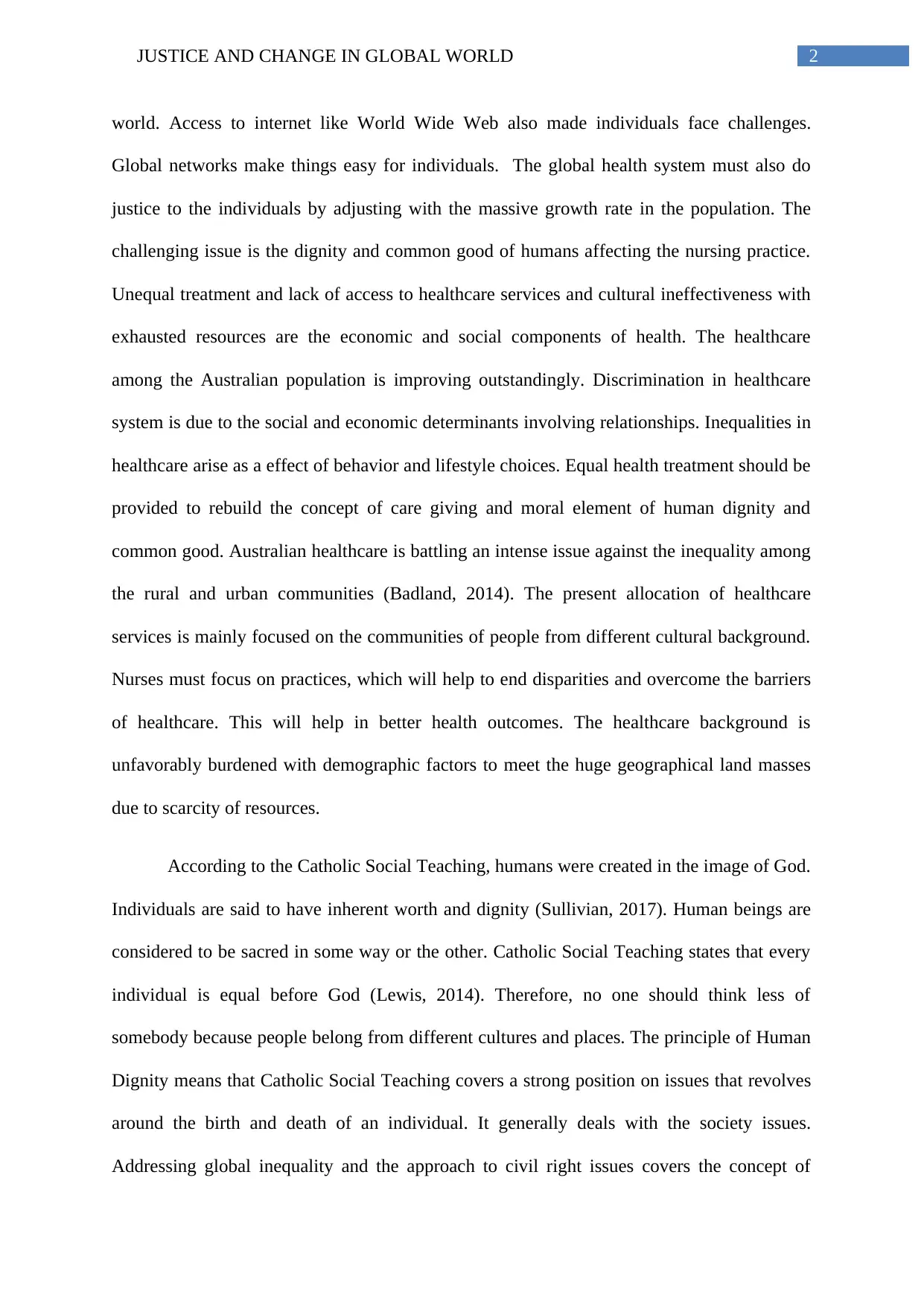
2JUSTICE AND CHANGE IN GLOBAL WORLD
world. Access to internet like World Wide Web also made individuals face challenges.
Global networks make things easy for individuals. The global health system must also do
justice to the individuals by adjusting with the massive growth rate in the population. The
challenging issue is the dignity and common good of humans affecting the nursing practice.
Unequal treatment and lack of access to healthcare services and cultural ineffectiveness with
exhausted resources are the economic and social components of health. The healthcare
among the Australian population is improving outstandingly. Discrimination in healthcare
system is due to the social and economic determinants involving relationships. Inequalities in
healthcare arise as a effect of behavior and lifestyle choices. Equal health treatment should be
provided to rebuild the concept of care giving and moral element of human dignity and
common good. Australian healthcare is battling an intense issue against the inequality among
the rural and urban communities (Badland, 2014). The present allocation of healthcare
services is mainly focused on the communities of people from different cultural background.
Nurses must focus on practices, which will help to end disparities and overcome the barriers
of healthcare. This will help in better health outcomes. The healthcare background is
unfavorably burdened with demographic factors to meet the huge geographical land masses
due to scarcity of resources.
According to the Catholic Social Teaching, humans were created in the image of God.
Individuals are said to have inherent worth and dignity (Sullivian, 2017). Human beings are
considered to be sacred in some way or the other. Catholic Social Teaching states that every
individual is equal before God (Lewis, 2014). Therefore, no one should think less of
somebody because people belong from different cultures and places. The principle of Human
Dignity means that Catholic Social Teaching covers a strong position on issues that revolves
around the birth and death of an individual. It generally deals with the society issues.
Addressing global inequality and the approach to civil right issues covers the concept of
world. Access to internet like World Wide Web also made individuals face challenges.
Global networks make things easy for individuals. The global health system must also do
justice to the individuals by adjusting with the massive growth rate in the population. The
challenging issue is the dignity and common good of humans affecting the nursing practice.
Unequal treatment and lack of access to healthcare services and cultural ineffectiveness with
exhausted resources are the economic and social components of health. The healthcare
among the Australian population is improving outstandingly. Discrimination in healthcare
system is due to the social and economic determinants involving relationships. Inequalities in
healthcare arise as a effect of behavior and lifestyle choices. Equal health treatment should be
provided to rebuild the concept of care giving and moral element of human dignity and
common good. Australian healthcare is battling an intense issue against the inequality among
the rural and urban communities (Badland, 2014). The present allocation of healthcare
services is mainly focused on the communities of people from different cultural background.
Nurses must focus on practices, which will help to end disparities and overcome the barriers
of healthcare. This will help in better health outcomes. The healthcare background is
unfavorably burdened with demographic factors to meet the huge geographical land masses
due to scarcity of resources.
According to the Catholic Social Teaching, humans were created in the image of God.
Individuals are said to have inherent worth and dignity (Sullivian, 2017). Human beings are
considered to be sacred in some way or the other. Catholic Social Teaching states that every
individual is equal before God (Lewis, 2014). Therefore, no one should think less of
somebody because people belong from different cultures and places. The principle of Human
Dignity means that Catholic Social Teaching covers a strong position on issues that revolves
around the birth and death of an individual. It generally deals with the society issues.
Addressing global inequality and the approach to civil right issues covers the concept of
⊘ This is a preview!⊘
Do you want full access?
Subscribe today to unlock all pages.

Trusted by 1+ million students worldwide
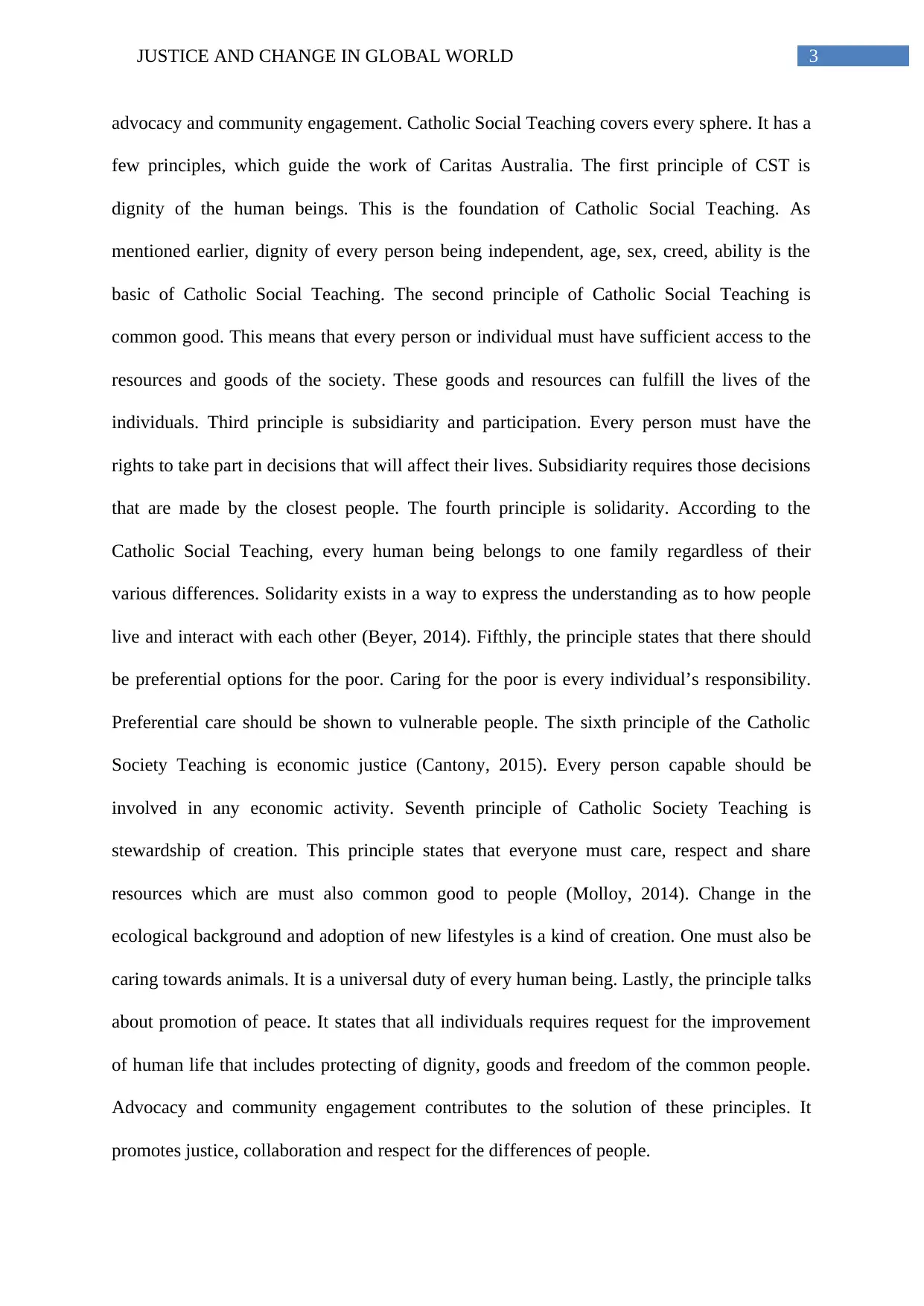
3JUSTICE AND CHANGE IN GLOBAL WORLD
advocacy and community engagement. Catholic Social Teaching covers every sphere. It has a
few principles, which guide the work of Caritas Australia. The first principle of CST is
dignity of the human beings. This is the foundation of Catholic Social Teaching. As
mentioned earlier, dignity of every person being independent, age, sex, creed, ability is the
basic of Catholic Social Teaching. The second principle of Catholic Social Teaching is
common good. This means that every person or individual must have sufficient access to the
resources and goods of the society. These goods and resources can fulfill the lives of the
individuals. Third principle is subsidiarity and participation. Every person must have the
rights to take part in decisions that will affect their lives. Subsidiarity requires those decisions
that are made by the closest people. The fourth principle is solidarity. According to the
Catholic Social Teaching, every human being belongs to one family regardless of their
various differences. Solidarity exists in a way to express the understanding as to how people
live and interact with each other (Beyer, 2014). Fifthly, the principle states that there should
be preferential options for the poor. Caring for the poor is every individual’s responsibility.
Preferential care should be shown to vulnerable people. The sixth principle of the Catholic
Society Teaching is economic justice (Cantony, 2015). Every person capable should be
involved in any economic activity. Seventh principle of Catholic Society Teaching is
stewardship of creation. This principle states that everyone must care, respect and share
resources which are must also common good to people (Molloy, 2014). Change in the
ecological background and adoption of new lifestyles is a kind of creation. One must also be
caring towards animals. It is a universal duty of every human being. Lastly, the principle talks
about promotion of peace. It states that all individuals requires request for the improvement
of human life that includes protecting of dignity, goods and freedom of the common people.
Advocacy and community engagement contributes to the solution of these principles. It
promotes justice, collaboration and respect for the differences of people.
advocacy and community engagement. Catholic Social Teaching covers every sphere. It has a
few principles, which guide the work of Caritas Australia. The first principle of CST is
dignity of the human beings. This is the foundation of Catholic Social Teaching. As
mentioned earlier, dignity of every person being independent, age, sex, creed, ability is the
basic of Catholic Social Teaching. The second principle of Catholic Social Teaching is
common good. This means that every person or individual must have sufficient access to the
resources and goods of the society. These goods and resources can fulfill the lives of the
individuals. Third principle is subsidiarity and participation. Every person must have the
rights to take part in decisions that will affect their lives. Subsidiarity requires those decisions
that are made by the closest people. The fourth principle is solidarity. According to the
Catholic Social Teaching, every human being belongs to one family regardless of their
various differences. Solidarity exists in a way to express the understanding as to how people
live and interact with each other (Beyer, 2014). Fifthly, the principle states that there should
be preferential options for the poor. Caring for the poor is every individual’s responsibility.
Preferential care should be shown to vulnerable people. The sixth principle of the Catholic
Society Teaching is economic justice (Cantony, 2015). Every person capable should be
involved in any economic activity. Seventh principle of Catholic Society Teaching is
stewardship of creation. This principle states that everyone must care, respect and share
resources which are must also common good to people (Molloy, 2014). Change in the
ecological background and adoption of new lifestyles is a kind of creation. One must also be
caring towards animals. It is a universal duty of every human being. Lastly, the principle talks
about promotion of peace. It states that all individuals requires request for the improvement
of human life that includes protecting of dignity, goods and freedom of the common people.
Advocacy and community engagement contributes to the solution of these principles. It
promotes justice, collaboration and respect for the differences of people.
Paraphrase This Document
Need a fresh take? Get an instant paraphrase of this document with our AI Paraphraser

4JUSTICE AND CHANGE IN GLOBAL WORLD
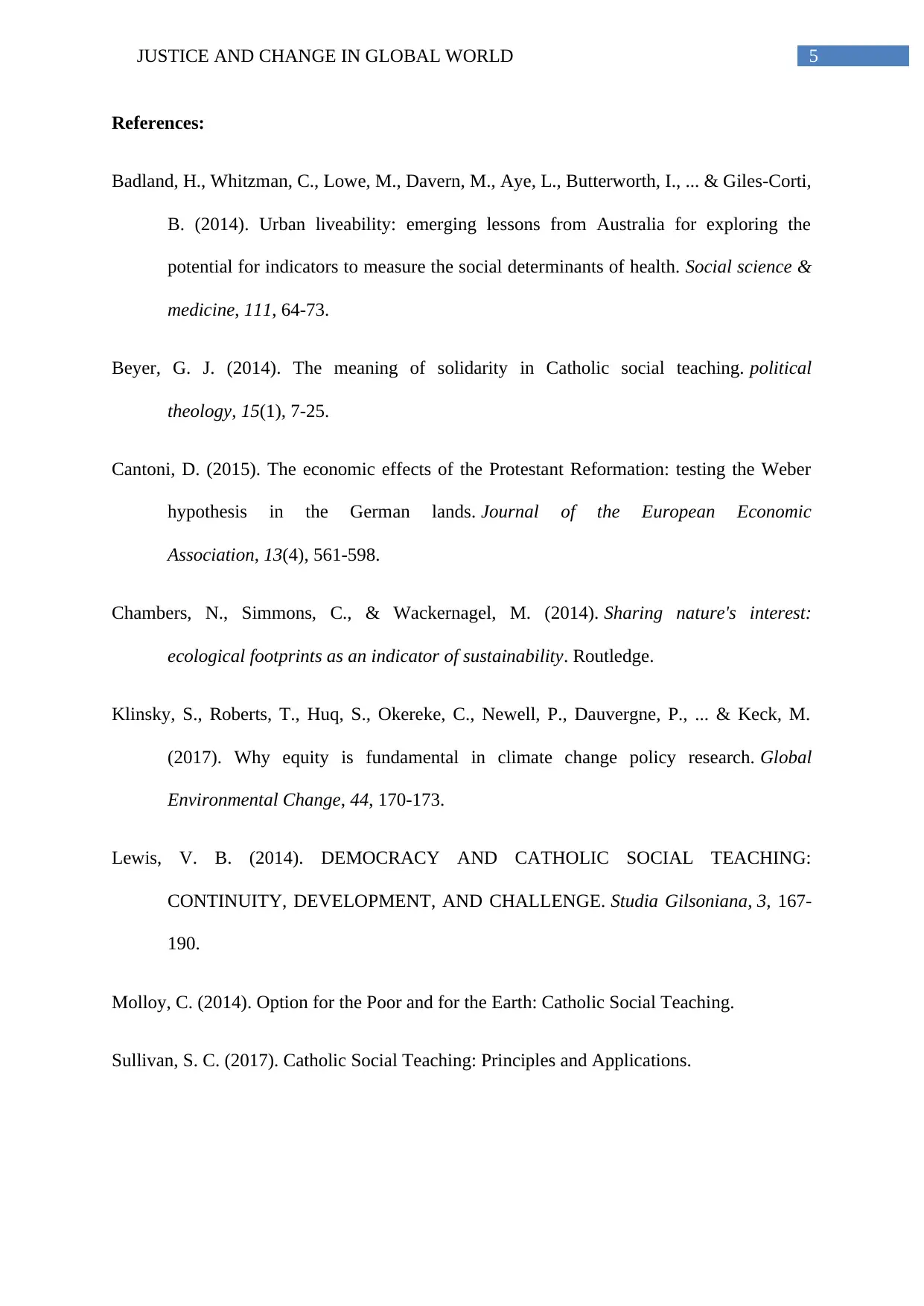
5JUSTICE AND CHANGE IN GLOBAL WORLD
References:
Badland, H., Whitzman, C., Lowe, M., Davern, M., Aye, L., Butterworth, I., ... & Giles-Corti,
B. (2014). Urban liveability: emerging lessons from Australia for exploring the
potential for indicators to measure the social determinants of health. Social science &
medicine, 111, 64-73.
Beyer, G. J. (2014). The meaning of solidarity in Catholic social teaching. political
theology, 15(1), 7-25.
Cantoni, D. (2015). The economic effects of the Protestant Reformation: testing the Weber
hypothesis in the German lands. Journal of the European Economic
Association, 13(4), 561-598.
Chambers, N., Simmons, C., & Wackernagel, M. (2014). Sharing nature's interest:
ecological footprints as an indicator of sustainability. Routledge.
Klinsky, S., Roberts, T., Huq, S., Okereke, C., Newell, P., Dauvergne, P., ... & Keck, M.
(2017). Why equity is fundamental in climate change policy research. Global
Environmental Change, 44, 170-173.
Lewis, V. B. (2014). DEMOCRACY AND CATHOLIC SOCIAL TEACHING:
CONTINUITY, DEVELOPMENT, AND CHALLENGE. Studia Gilsoniana, 3, 167-
190.
Molloy, C. (2014). Option for the Poor and for the Earth: Catholic Social Teaching.
Sullivan, S. C. (2017). Catholic Social Teaching: Principles and Applications.
References:
Badland, H., Whitzman, C., Lowe, M., Davern, M., Aye, L., Butterworth, I., ... & Giles-Corti,
B. (2014). Urban liveability: emerging lessons from Australia for exploring the
potential for indicators to measure the social determinants of health. Social science &
medicine, 111, 64-73.
Beyer, G. J. (2014). The meaning of solidarity in Catholic social teaching. political
theology, 15(1), 7-25.
Cantoni, D. (2015). The economic effects of the Protestant Reformation: testing the Weber
hypothesis in the German lands. Journal of the European Economic
Association, 13(4), 561-598.
Chambers, N., Simmons, C., & Wackernagel, M. (2014). Sharing nature's interest:
ecological footprints as an indicator of sustainability. Routledge.
Klinsky, S., Roberts, T., Huq, S., Okereke, C., Newell, P., Dauvergne, P., ... & Keck, M.
(2017). Why equity is fundamental in climate change policy research. Global
Environmental Change, 44, 170-173.
Lewis, V. B. (2014). DEMOCRACY AND CATHOLIC SOCIAL TEACHING:
CONTINUITY, DEVELOPMENT, AND CHALLENGE. Studia Gilsoniana, 3, 167-
190.
Molloy, C. (2014). Option for the Poor and for the Earth: Catholic Social Teaching.
Sullivan, S. C. (2017). Catholic Social Teaching: Principles and Applications.
⊘ This is a preview!⊘
Do you want full access?
Subscribe today to unlock all pages.

Trusted by 1+ million students worldwide
1 out of 6
Related Documents
Your All-in-One AI-Powered Toolkit for Academic Success.
+13062052269
info@desklib.com
Available 24*7 on WhatsApp / Email
![[object Object]](/_next/static/media/star-bottom.7253800d.svg)
Unlock your academic potential
Copyright © 2020–2026 A2Z Services. All Rights Reserved. Developed and managed by ZUCOL.





